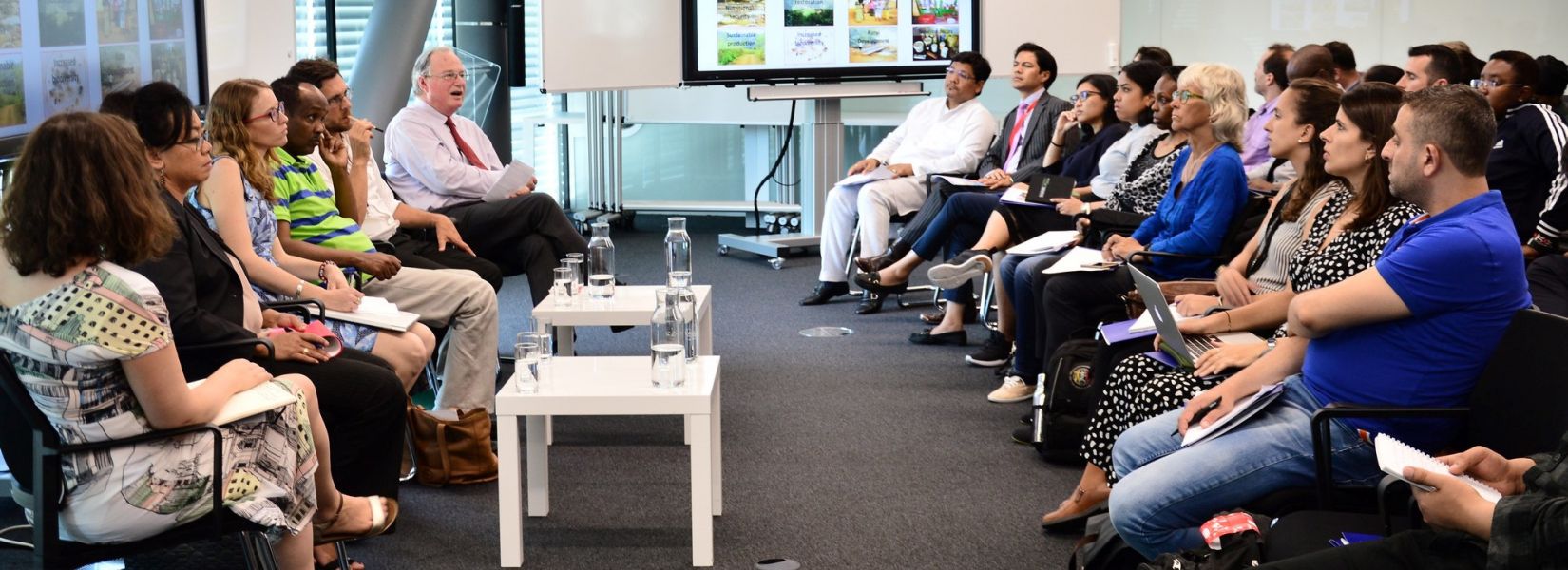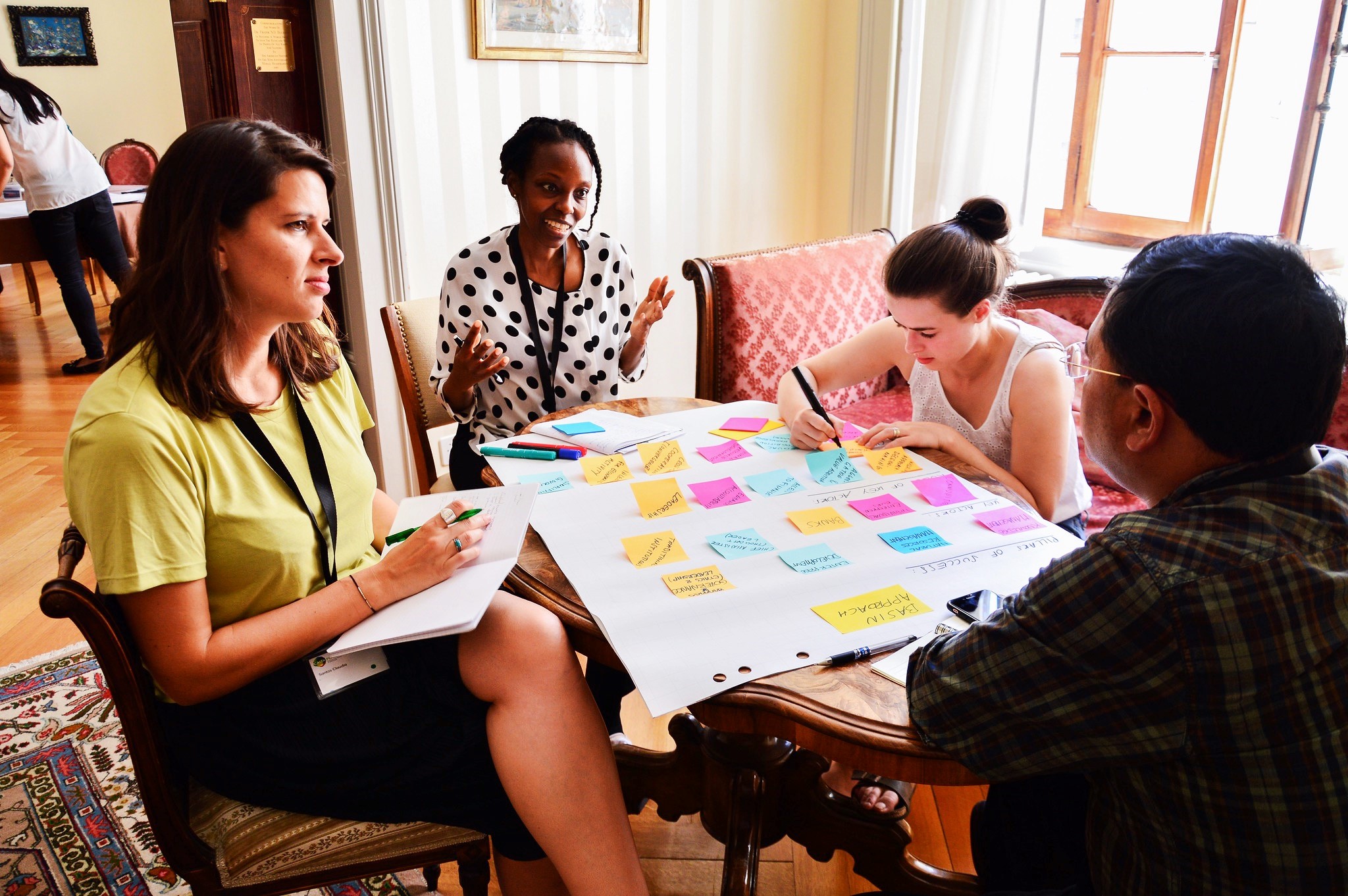Summer Academy on Land, Security and Climate is launched in Geneva and Caux
Caux Dialogue on Land and Security 2019
10/08/2019
Conflict, environmental degradation and climate change interact in negative feedback loops. Only enhanced cooperation between nations, and across disciplines, will generate adequate solutions.
Initiatives of Change (IofC) and the Geneva Centre for Security Policy (GCSP) have responded to the challenge by launching a series of Summer Academies on Land, Security and Climate. Their purpose is to inspire and equip the next generation of policymakers and researchers with the interdisciplinary insights, skills of collaboration and trustbuilding, and networks needed to safeguard the future of humanity.
The inaugural Summer Academy brought together 18 participants from Afghanistan/Denmark, Bhutan, Germany, Kenya, India, Indonesia, Nigeria/UK, Philippines, Portugal, Somalia/UK, Spain/Switzerland, Sweden and Syria/Turkey. It was officially launched at the GCSP on 26 June 2019.
Ambassador Doreen de Brum, Chair of the Climate Vulnerable Forum of Nations and Permanent Representative of the Marshall Islands to the United Nations, spoke of the harsh realities of climate change. ‘The term “climate refugee” is not a theoretical one for us,’ she said. ‘When I think of the next generation of Marshallese people, I don’t know if they will have a country.’
His Excellence Conrad Sangma, Chief Minister of Meghalaya, India, drew a link between the role of IofC in the peaceful creation of his state in 1972 and the need for collaborative solutions to safeguard the natural environment today. ‘We need to have good relations with all our neighbours,’ he said. ‘We have the highest rainfall in the world. Meghalaya has become the first state in India to draft a comprehensive State Water Policy. This will enable us to better manage our water resources, to ensure longterm water security and equity. One thing we are doing is ensuring the supply of clean water to Bangladesh.’
Over the next four days, the Summer Academy took place in tandem with the Caux Dialogue on Land and Security (CDLS), part of the Caux Forum.
Mukhtar Ogle, Secretary for Strategic Initiatives in the Cabinet Affairs Office of the Executive Office of the President of Kenya, served as a resource person throughout the course. During the opening plenary of the Caux Dialogue, Ogle highlighted the importance of the Dialogue on Land and Security which took place in Baringo County, Kenya, in 2016. It was initiated by two county administrators who were inspired by taking in part in the CDLS at Caux in 2015. ‘After the Baringo dialogue,’ he said, ‘we framed our responses to security with reference to land and to climate change.’
Another speaker was Bruno Jochum, former Director General of Médecins sans Frontières, Switzerland, and Executive in Residence at GCSP. Jochum highlighted the challenges that will be faced by the humanitarian sector in the face of climate change. He emphasized that all actors – from governments and large companies through to each individual – need to ‘walk the talk’ in terms of implementing climate change solutions. ‘We have to take responsibility for our actions in the spaces we have control over,’ he said.
Other Summer Academy faculty included Professor Roger Leakey, Vice-Chairman of the International Tree Foundation; Dr Constance Neely, Senior Advisor at the World Agroforestry Centre; Dr Dhanasree Jayaram, Coordinator of the Centre for Climate Studies, Manipal Academy of Higher Education; Marc Barasch, Founder of Green World Campaign; Alan Laubsch, CEO of Generation Blue; Josep Gari, Senior Policy Advisor at UNDP; Gunilla Hamne, Founder of Peaceful Heart Network and Rishabh Khanna, from the Executive Committee of Initiatives for Land, Lives and Peace.
Dr Dennis Garrity, Drylands Ambassador for the UN Convention to Combat Desertification and Chair of the Global EverGreening Alliance, recorded a video lecture for the Academy. He cited examples of communities in Kenya, Ethiopia, and Niger which are pioneering their own solutions to challenges at the nexus of land degradation, conflict and climate change.
The vital importance of forging local solutions, and understanding the ingredients required for their success, was the theme of the Academy’s final workshop, chaired by Louise Brown from Namibia, Coordinator of the Africa Climate Change Fund of the African Development Bank.
As the 18 participants brainstormed together on how local, regional and global challenges could be met, it became hard to draw the session to a close. Everyone left with the same question: ‘What can my organization do, what can I do, to address these challenges?’
‘This Summer Academy was a fantastic initiative,’ Brown concluded. ‘I am excited about where it is going.’
Her enthusiasm was shared by the participants. 'I will be talking to my colleagues about the core skills of dialogue,’ said Claudia Santos, from Portugal. ‘I noticed changes in how I approached certain situations on the first day in comparison to the last day of the Summer Academy. It was self-transformational! I take these learnings very close to my heart in everything I do going forward.'
‘Thank you all so much for the safe space you created to share and think through many of the challenges in environmental security in our world today,’ said Dr Muna Ismail from UK/Somalia.
‘I really wish and hope a long future for the Summer Academy,’ said Ahmed Ekzayez from Syria/Turkey. ‘It was a great exchange.’
Conversations during the Summer Academy have already sparked new project prospects in Kenya and India. Participants are keeping in touch and continuing to exchange ideas through a WhatsApp group.
The Summer Academies on Land, Security and Climate are designed and delivered by Dr Alan Channer, of IofC’s Land, Lives and Peace programme, and Anna Brach, Head of Human Security at the Geneva Centre for Security Policy. The inaugural course was made possible by the generous support of the African Climate Change Fund of the African Development Bank and two private foundations.
Read more about the Summer Academy in the July editon of A propos, the magazine of Swisspeace.
Text: Alan Channer PhD
Photos: Leela Channer






































